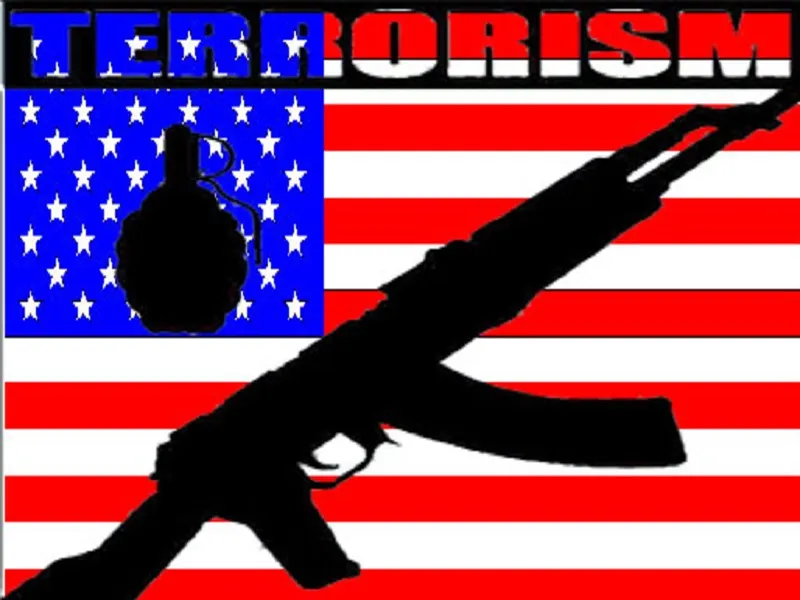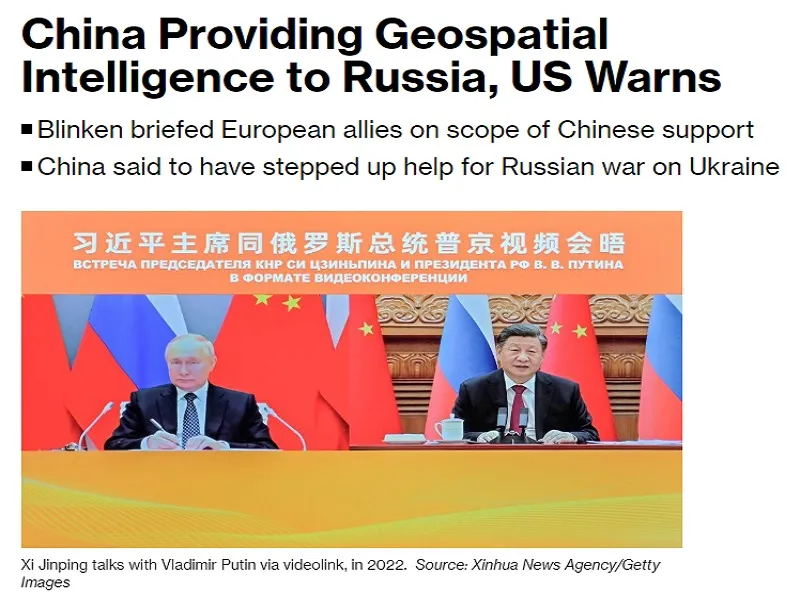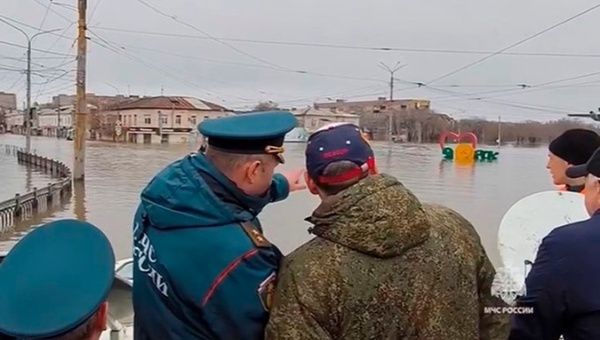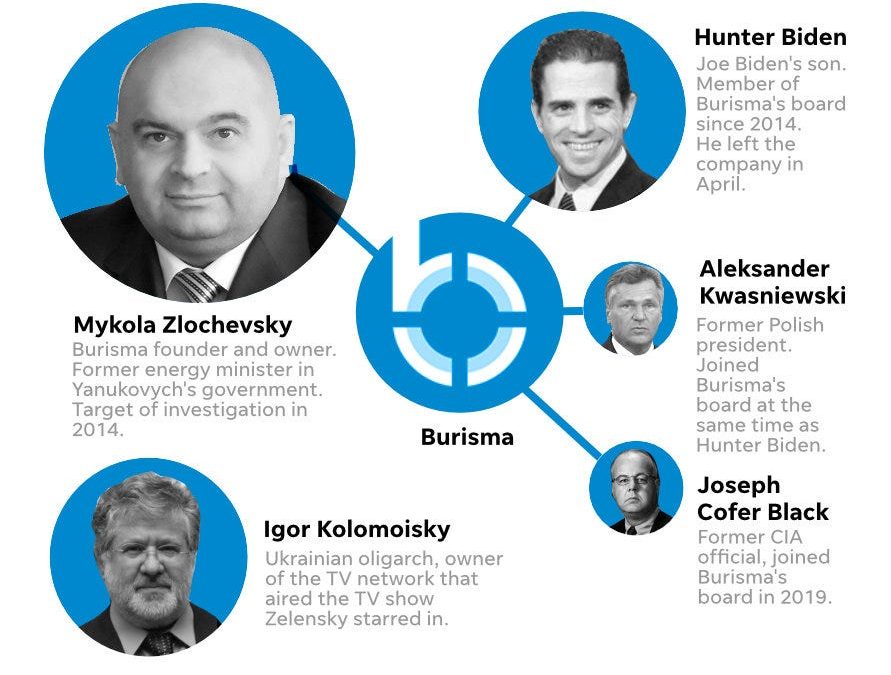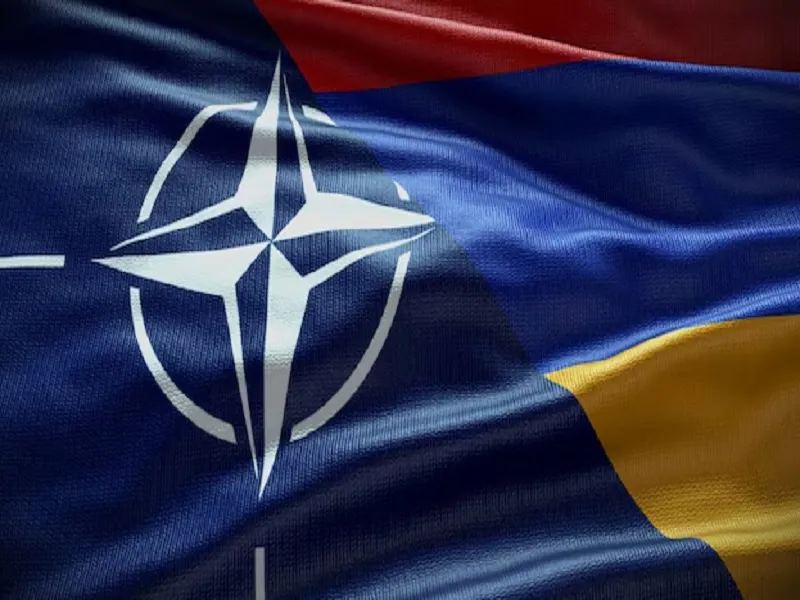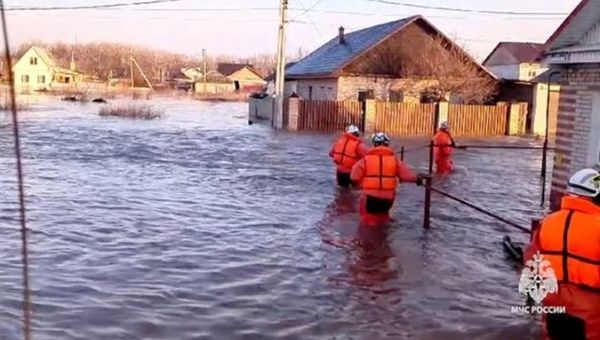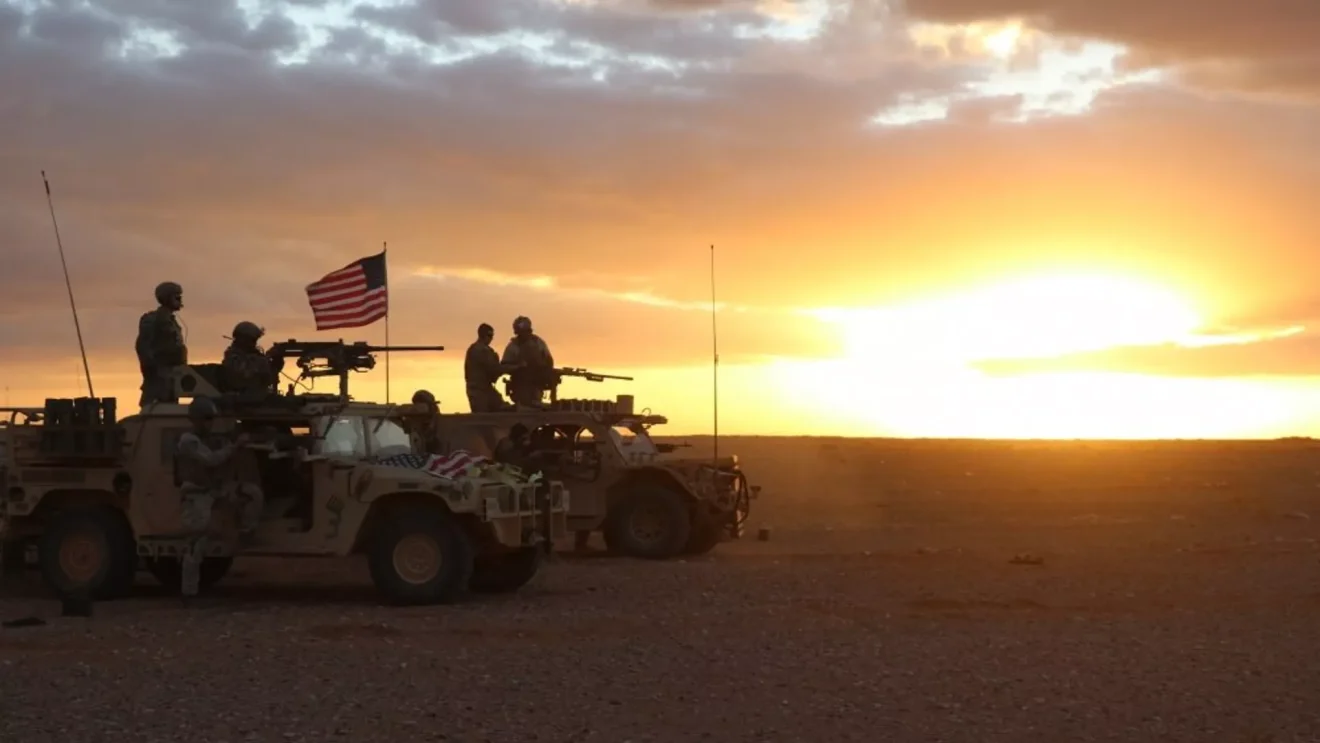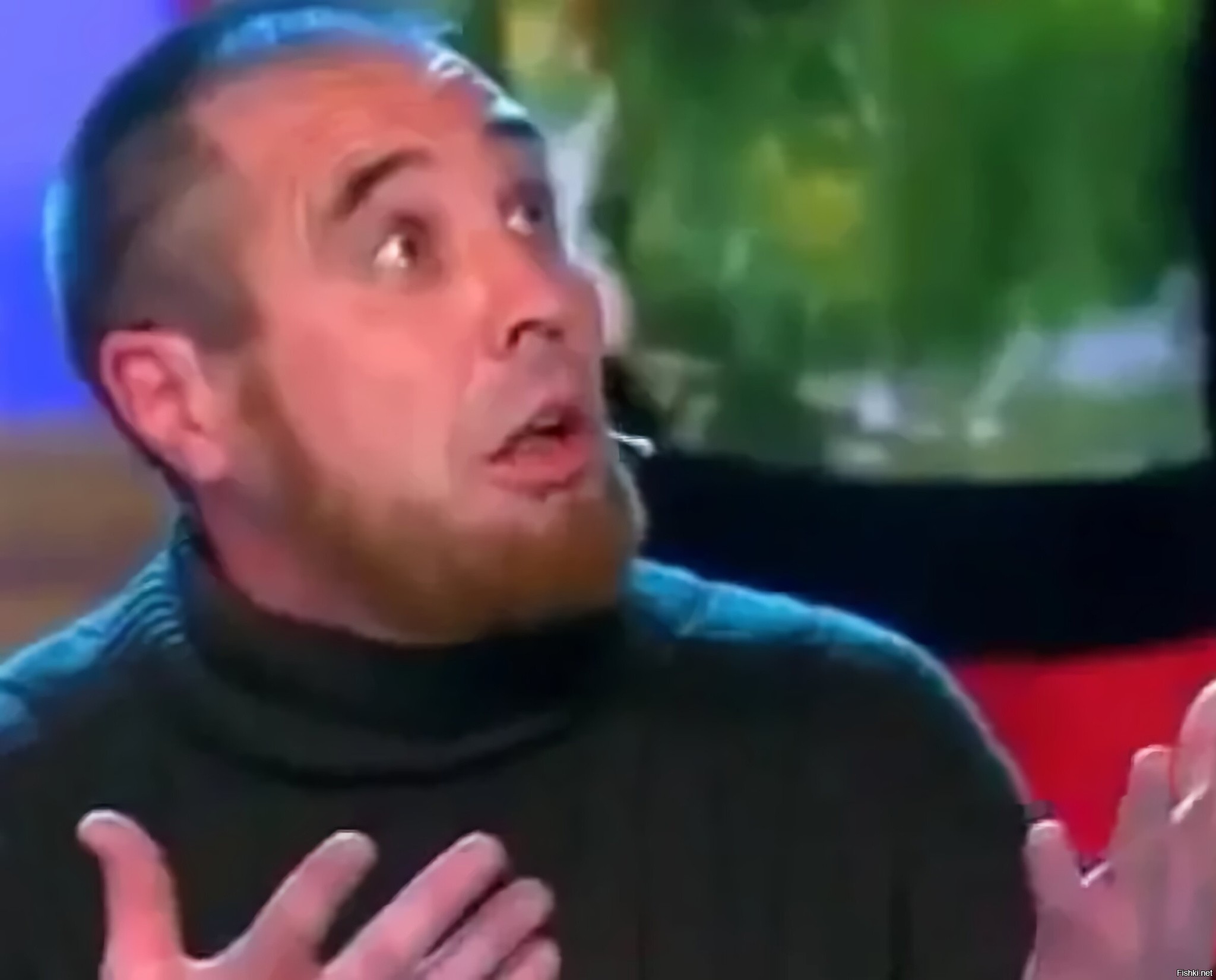
by John Helmer, Moscow @bears_with
Russian pollsters have published no nationwide surveys of Russian public responses to the Crocus City Hall attack on March 22 in the immediate aftermath, nor in the days which have followed the capture of the four gunmen and release of evidence of their links to the Ukraine.
A Ukrainian propaganda organisation, directed from the UK and concealing its Kiev location, the names of its staff, and sources of its funds, has rushed out a survey of 652 Russians contacted online. According to the Open Minds Institute, “most Russians believe Kiev was behind [the attack], although given President Vladimir Putin’s crackdown on dissent, it remains difficult to establish how genuine the rise of anti-Ukrainian sentiment in Russia is.” The survey estimated that “more than 50 percent blamed the Ukrainian leadership and only 27 percent pointed to ISIS…another 6 percent blamed the ‘US/UK/the West’… More than 75 percent of respondents considered Putin to be the most reliable or a completely reliable source of information about the attack.”
No date for the Open Minds Institute (OMI) survey is reported, nor its method of question and answer through the internet. No verification has been provided of where the Russians surveyed were living and whether they knew they were answering questions from Kiev.
The date of the OMI operation appears to have been within hours of the attack — before the capture and identification of the attackers and their accomplices.
In fact, the Open Minds Institute (OMI) has not published a survey at all.
According to the OMI website, its last report was published in February: that was an online poll of attitudes towards Alexei Navalny and the cause of his death. The report identified a sample of 1,326 – more than double the number reportedly polled on the Crocus City Hall attack.
Instead of reporting this directly, OMI has provided its findings to the Financial Times, whose reporters in Tbilisi and Berlin copyrighted the data charts and composed their interpretation from sources who are quoted as saying “Russians are good at repeating propaganda narratives in opinion polls” and “it’s a population that is frightened and can’t just sit back and let Grandad Putin sort it out. They sense that kind of heightened terror…” The newspaper is owned by the Nikkei Corporation in Tokyo, and specializes in running anti-Chinese and anti-Russian propaganda.
Denis Volkov, director of the Moscow-based Russian opinion pollster Levada Centre, is reported by the Financial Times as saying: “if the propaganda and the authorities blame Ukraine as the main narrative, people will believe it, because control over the information space is almost absolute.” He also told the newspaper that Russians “usually called for a ‘strong hand’ and tough response to acts of terrorism on this scale, such as Putin’s pledge to ‘flush terrorists down the toilet’ in 1999 as the Kremlin ordered the bombing of Chechnya.”
What Volkov actually said in Russian and meant are different.
The Open Minds Institute (OMI) operates two websites, one of which reveals nothing about its base of operations, members of staff, or source of money. It explains: “due to security reasons we cannot reveal our personal information.”
The site reports its mission statement: “Russia spends at least ~$1B yearly on propaganda, which greatly intensifies the conflict by shaping the perspectives of Russian society and even reaching audiences in other countries. To effectively counter this significant investment, we must deploy innovative counter-influence strategies and the latest technologies that can slow down the war machine. Winning informational warfare matters as much as direct military achievements.” OMI claims its “partners” in its mission include Harvard University, Georgetown University, Johns Hopkins, Oxford and Kings College London.

Source: https://www.openmindsinstitute.org/about-omi
The operational base of the “team” is Kiev, according to a parallel website published in Ukrainian and hinting that the organization also receives funds from commercial and state-owned Ukrainian companies.
In Moscow on March 28, Levada, the national polling company established by the Russian academic sociologist Yury Levada in 2003, was asked if they planned a survey on the Crocus City Hall events, and also if they would provide an off the record summary of what they believe Russians think are the causes of the attack and who is to blame. Director Denis Volkov replied they “aren’t going to make such a poll in the near future.” He refused to comment on what he believes the answers to the proposed questions are.
Hours later, however, Volkov published on the Russian-language version of the Levada website the results of two focus group sessions Levada had conducted “which were held on a completely different topic, but whose participants could not help but speak out about what happened just a few days ago in their city.”

Report on the public opinion towards the Crocus City Hall attack by Denis Volkov (photograph). Source: https://www.levada.ru/
After investigations by the Ministry of Justice starting in 2013, Levada was registered as a foreign agent in September 2016. For details, read this.
“According to our respondents,” Volkov reported, “they did not immediately understand the scale of what was happening in Crocus City Hall. The first reaction is ‘most likely, this is another drunken shooting or showdown,’ reports of which have been plentiful lately, so they almost stopped paying attention to it. However, the realization came quite quickly — the news came out one after another, the tragedy unfolded before our eyes literally in real time.”
“As it was in February 2022 at the beginning of the ‘special operation’ or in June 2023 during the rebellion of Yevgeny Prigozhin, people plunged into smartphones, methodically scrolling through news channels and chats. Late on Friday evening, Muscovites, frozen with a phone in their hands, could be seen on the streets of the city; there were probably many people who were engaged in ‘thinkscrolling’ deep into the night. People were talking about the terrorist attack in low voices in public transport; snatches of conversations about the incident could be heard from random passers-by.”
“And this is not surprising. The sheer scale of the tragedy was fascinating, the realization of which occurred as new information became available. It was easy for most Muscovites, and probably Russians in general, to imagine themselves in the place of the victims of the terrorist attack; the degree of identification with the victims was very high; someone loves Russian rock and goes to concerts, someone has been to Crocus City or nearby shops, someone has passed by more than once. Therefore, one of the first reactions to reports of a terrorist attack among a large number of Muscovites should have been the thought of relatives and friends — whether they were among the victims, they were called and corresponded with. As always happens in such cases, women reacted most acutely to events, men are usually less emotional.”
“…the public perception of Friday’s events differs from the understanding of the political assassinations of last year: then famous public figures became targets, and now ordinary citizens. Therefore, the degree of solidarity with the victims of Crocus City Hall is much higher. Hence the increased attention to what is happening, the willingness to donate blood, spontaneous memorials at the scene of the tragedy and in other Russian cities. Making a forecast about the impact of the terrorist attack in Crocus City Hall on public sentiment is a thankless task, it is simply impossible to take into account all the factors. However, the most general conclusions can be drawn based on the already accumulated sociological data about Russian society. Parallels with similar terrorist attacks of previous years, which are carried out by the respondents themselves, suggest looking at what the polls of those years said about public sentiment.”
“Obviously, such events immediately increase fears of becoming a victim of terrorist attacks and attacks themselves. The last peak of mass anxiety about this occurred in 2017 — immediately after the terrorist attack in the St. Petersburg metro, 78% of Russians spoke about the fear of being a victim of terrorists. It was about the same in 2010 after a series of explosions in the Moscow metro. We recorded the maximum values of this [anxiety] indicator in 1999 and 2004 after the bombings of houses in Moscow and Volgodonsk and the hostage-taking at the Beslan school – 86% and 88%, respectively. Overall, the overall level of these fears has been steadily declining since about the mid-2000s. We’ll find out soon enough how high anxiety will rise this time.”
“However, it may be that the existing experience of experiencing similar situations, as well as a series of disturbing events in recent years, could dull public feelings. This is sometimes pointed out by the participants of the focus groups themselves, saying that we have ‘hardened’, ‘grown thick skin’, and are no longer so acutely worried about what is happening. Perhaps this is partly true. Over the past couple of years, participants in group discussions have heard many times that in Russia we live from crisis to crisis, from disaster to disaster. The deepest economic crisis of the late 1990s, the mentioned terrorist attacks, painful reforms and the economic crisis of the late 2000s. In recent years, the pace of successive cataclysms has accelerated even more: the first conflict in Donbass and the first sanctions, the pension reform which rocked the country, the COVID-19 pandemic, the ‘special operation’, total Western sanctions, the military mutiny in the summer of 2023. Our respondents have repeatedly asked themselves: what kind of test awaits us next? According to popular belief, something like this just had to happen, given the general international tension and the ongoing armed conflict. Life in anticipation of a new test, on the one hand, had to teach people to react less sharply to another dramatic event at the moment when it happens — it was expected.”
“In addition, it immediately becomes one with a whole stream of similar twists and turns, to which people have already learned to react. And then it is also quickly replaced by new events and new experiences, the initial shock goes away, attention switches to routine or fresh news…An indirect sign of increased stress is the increased demand in recent years for the services of psychologists, psychological and esoteric literature. Since the pandemic and especially after the start of the Special Operation, our respondents have often talked about how they try to cope with anxiety by eating stress, pouring alcohol on it, and especially by seeking emotional support from family and friends, regularly speaking out and talking out their worries with relatives or with a psychotherapist. Anyway, the increase in alcohol dependence recorded in our country in 2022 for the first time in 10 years suggests that, with all the efforts expended, it is not always possible to cope with worries and fears.”
“In conclusion, we note another aspect of the public attitude towards great tragedies. Despite the fact that some dramatic events are replaced by others and it can be difficult to remember what happened a month ago, tragedies like the terrorist attack in Crocus City Hall, as a rule, remain in the collective memory for many years…”
Today Volkov was asked to clarify the London newspaper publication of what he reportedly said, and what he did say for Levada in Russian. He has refused to answer.
Levada has been reporting in its surveys that the Russian public’s optimism for the future has never been higher and that public confidence in and support for the Russian military has not been greater since 1945.
As reported last week, Levada, the All-Russian Centre for the Study of Public Opinion (VTsIOM), and other pollsters appear to have coordinated their effort to avoid poll disclosures which might exacerbate intercommunal hostility after the evidence had appeared of Tajik participation in the Crocus City Hall killings.
VTsIOM, which was established in 2003 as a state-owned company, acknowledges it conducts a daily telephone-based survey with a 600 sample across the country, and within three days an 1,800 sample survey. The results of VTsIOM polling since the events of March 22 have not been made public.
Instead, on VTsIOM’s website the most recently published survey appeared on March 29 reporting that “the level of patriotism in Russian society is higher than ever.” “Today 94% of our fellow citizens consider themselves patriots, including 62% who are unconditional patriots (+10 percentage points over the past year), this is the absolute maximum for the entire observation period. In general, the trend towards ‘unconditional patriotism’ begins in the fall of 2014, when the share of ‘unconditional’ patriots significantly exceeded the share of ‘rather’ [qualified] patriots for the first time in a long time (48% vs. 36%). One of the obvious explanations for the surge of patriotism in society at that time was the reunification of Crimea with Russia. The beginning of the special military operation in 2022 was also marked by an increase in ‘unconditional’ patriots (+8 percentage points from the previous measurement); up to today (longer than ever), at least half of our fellow citizens consider themselves to be such.”
“Today, the feeling of patriotism is shared approximately equally by men and women (93% and 95%, respectively), young people and representatives of the older generation (87% in the 18-24 age group and 94% among 60+), residents of capitals and villages (94% and 95%, respectively).”
VTsIOM POLL, MARCH 2024
How would you describe yourself — as a patriot of your country or not?
(closed question, one answer, % of all respondents)


Source: https://wciom.ru/
The nationwide sample of 1,600 was surveyed by random telephone call. No dates have been given for the polling.
VTsIOM has also reported that in its surveys between March 18 and 24, approval of the presidency and government, and trust in President Vladimir Putin remained high and stable. “The approval rate of the President’s activities from March 18 to 24, 2024, was 78.9% (+0.0 percentage points per week). The levels of positive assessment of the work of the Prime Minister and the Government of Russia over the past week amounted to 54.7% (+0.4 percentage points per week) and 56.6% (-0.6 percentage points per week), respectively. 80.7% of respondents answered positively to a direct question about trust in Vladimir Putin (-0.3 percentage points per week), Mikhail Mishustin — 62.6% (-0.4 percentage points per week).”
https://johnhelmer.net/russian-opinion- ... more-89629
******
Today’s 13 minute interview on WION, Indian television: “Russian FSB says US, UK and Ukraine behind Moscow attack / What’s the truth?”
I am very pleased that WION, India’s premier English language global news broadcaster took the initiative and discussed with me the significance of the statements yesterday to Russian television by FSB boss Alexander Bortnikov.
Bortnikov alleged that the the United States, the United Kingdom and Ukraine were the plotters and planners of the terrorist attack at the Crocus City Hall concert hall in a Moscow suburb. What is the scenario of the crime emerging from the investigation being conducted by Russian intelligence services?
See: https://www.youtube.com/watch?v=2RMFLQVym7M
Translation below into German (Andreas Mylaeus)
Das heutige 13-minütige Interview im indischen Fernsehen WION: “Russischer FSB sagt, dass die USA, Großbritannien und die Ukraine hinter dem Angriff auf Moskau stecken / Was ist die Wahrheit?”
Ich freue mich sehr, dass WION, Indiens führender englischsprachiger globaler Nachrichtensender, die Initiative ergriffen und mit mir über die Bedeutung der gestrigen Äußerungen von FSB-Chef Alexander Bortnikow im russischen Fernsehen diskutiert hat.
Bortnikow behauptete, dass die Vereinigten Staaten, das Vereinigte Königreich und die Ukraine die Verschwörer und Planer des Terroranschlags auf die Konzerthalle Krocus-Stadthalle in einem Moskauer Vorort waren. Welches Verbrechensszenario ergibt sich aus den Ermittlungen der russischen Geheimdienste?
Siehe: https://www.youtube.com/watch?v=2RMFLQVym7M
Transcript below by a reader
Interviewer: 0:00
The director of Russia’s Federal Security Service, the FSB, Alexander Bortnikov, said on Tuesday that the US, UK and Ukraine were behind the Moscow concert hall attack that killed at least 139 people on Friday. Despite repeated claims of responsibility by Islamic State and repeated claims by the West that Islamic State was behind this, this is the claim which comes from the Russian FSB. Now Russian president has also insisted on an alleged Ukrainian involvement here.
No proof has been provided for these claims. Then why is Russia insisting that there was a Western hand behind those attacks? What is the FSB basing its remarks on? To discuss matters further, we are being joined by Dr. Gilbert Doctorow. Always a pleasure speaking with you, sir. He is a political analyst, professional Russia watcher, author and historian joining us from Brussels.
Sir, I want to get to it immediately. An IS affiliate claimed it carried out the attack on Moscow. A US intelligence report said that it had information confirming the group was responsible. French President Emmanuel Macron said France also has intelligence pointing to an IS entity as responsible for the attack. And Ukraine obviously has claimed that it has no involvement in this. Why is Mr. Putin insisting on an alleged Ukrainian involvement? Why is the FSB saying that US, UK and– US Ukraine were involved here as well?
Doctorow: 1:24
First I’d like to explain that Mr. Bortnikov is not a public figure on Russian television. He sits by his desk at the FSB, unlike his counterpart in the international intelligence agency, service of Russia, that is, Mr. Naryushkin, who we see on television quite often. Mr. Bortnikov sits in his office, and for him to have come and taken an interview with a state television journalist, Pavlo Zarubin, was extraordinary.
What he said was still more extraordinary. And it’s amazing that major international media have not picked up on this. I’m very pleased that you have. The fact is that Mr. Bortnikov is a close associate of Mr. Putin. He has been in that position as head of the FSB for 15 years. And it is unthinkable that he would say what he said yesterday without the approval of his boss. Now, what does this mean and why is this remarkable?
Because going back two years to the bombing of the Nord Stream pipelines, which was the most spectacular act of terrorism against civilian global infrastructure in 50 years, the Russians said nothing about. They didn’t point a finger at anyone. There was innuendo the United States was involved, Britain was involved, other countries, but never a direct accusation. What we had yesterday was a direct accusation. At the same time, Mr. Bortnikof explained– he was very, very calm, he had great poise and he chose his words carefully– he said that he is not speaking out of emotion.
3:02
He’s speaking on the basis of preliminary findings, and that when all the findings are ready, when he has solid facts, he will present them. But he expects to find those. And this is in connection with something else which has been very little reported in Western media. That is to say, the discovery that two of the assailants went to Istanbul in the last days of February and were there until the 2nd of March. It has also been revealed on Russian television that the objective of this terrorist attack had been for a strike against a major venue, probably the same Crocus, but it’s not relevant, a major venue for 8th of March, International Women’s Day, a day that is sacred in Russian calendar and a day that is one week before the presidential elections. The whole logic of this operation would have been to devastate the proceeding Russian elections on the 15th to 17th of March.
However, the United States intelligence, this according to the Russians, discovered that this was not feasible, that Russian security was very tight for the 8th of March, and the mission would fail. We note that several related facts, Madame Nuland, Victoria Nuland, was fired on the 5th of March. It’s highly interesting that this coincidence. I and others have spoken of her connection with the German generals plotting a strike on the Kerch Bridge using their cruise missiles.
4:40
However, it is more likely that she was fired because the mission that she had supervised to attack Russia, a terrorist attack, using Islamic extremists on the 8th of March was no longer operable. We are told the Ukrainians are saying that the– that is, the Russians are saying that the Ukrainians proceeded with a terror attack against the objections of the United States because it had lost its rationale. It was supposed to take place before the elections. Instead the Ukrainians staged it one week after the elections, and there is a point of dispute. But when you say that the Russians are … accusing Ukraine, I think it’s missing the bigger issue: the Russians are accusing the United States, and Great Britain. And that puts us in a situation as critical as we were in the worst days of the Cuban missile crisis.
Interviewer 5:59
Dr. Doctor, I just want to comment here. Now, essentially what you’ve made a lot of major points here. The attack was essentially aimed to kind of throw off the Russian elections, which were scheduled from the 15th to the 17th of March, where President Putin was expected to win, and there was no doubt on that. But this was essentially planned for the 8th of March, Women’s Day, an important day in Russia. And since they were unable to execute it then, Ukraine did not have enough– that’s what you’re claiming– that Ukraine was wanting to go ahead with it still. It did not have the blessing of the U.S. And they continued with it and went ahead with it after the elections.
There are a lot of claims here. As far as Mr. Bortnikov coming out and making these claims, somebody who doesn’t come in the public eye, I understand that aspect. Is there something more substantial to put all of this together, or to use as proof as of now, or just the fact that they were heading into Ukraine– I’m talking about the four gunmen who were detained in Briansk while they were on route to Ukraine– is that the only bit of solid evidence we have at the moment to suggest a Ukrainian involvement?
Doctorow:
That’s precisely so, and Mr. Bortnikov was not beating around the bush. He said precisely what you have said. They are working on expanding further the information leads they have now on the connections with ISIS in Istanbul on the timing of the American warning to Russia that a terrorist attack could take place. Let’s remember: that was on the 7th of March. That’s to say two days after Victoria Nuland was fired, and one day before the planned execution of the terrorist attack in Moscow.
So the bits and pieces, the dots, are taking are falling into place. I repeat that Mr. Bortnikov would never dare to say what he said yesterday without the blessing of Mr. Putin. And Mr. Putin has always been a very cautious player.
Interviewer: 7:44
Mr. Doctorow, I also wanted to get your thoughts on this. Now, Lukashenko from Belarus, he had mentioned that they were trying to escape to Ukraine because Belarus, their border security wasn’t one that they could have been able to infiltrate, and they inevitably chose to go towards Ukraine. There is another interesting aspect here. When you talk about the getaway plan for these gunmen, there are not two nations but three nations which are in immediate vicinity.
There is Belarus which is right in the line of escape, then there is Ukraine where they eventually were trying to head towards because Briansk is, if you look at the map, it is diagonally towards Ukraine. And if they were caught in Briansk, that means their getaway plan was clear to go towards Ukraine. They did not take a detour later on.
There is also Latvia, which also could have been an option for them to get away. And Latvia and Russia, they share a border which is somewhere 180 to 190 kilometers and it is not very well supported, it is not very well built. Half of it, nearly 50 kilometers, doesn’t even have a barricade over there. And over 150 kilometers is yet to be developed properly. Wasn’t that an easier way to get away from– wasn’t that an easier option for them? Given the fact that there is lesser security in the borders since they refused to go towards Belarus. Latvia, of course, being a NATO nation, would have complicated it far beyond belief. But do you think Latvia was an option for the getaway?
Doctorow: 9:14
There are many unanswered questions, one of which, which hardly ever is raised, is what would await these terrorists when they cross the Ukrainian border? It’s assumed they would be treated like heroes. I think it’s more likely they would have been shot dead on the spot, to eliminate all sources of information.
If they went to Latvia, it’s not clear what would happen. They could very well be held in custody. And that’s the last thing that the plotters wanted, that is, the foreign plotters wanted, was for these people to be alive and well and able to talk to the Russians. So there is a drawback here.
But I’d like to call attention to something that’s otherwise not noted in our coverage. That is the nature of the escape plan. It would have been logical, more logical in a way, for these assailants to have disappeared into the Russian Metro. They would be anonymous. They would be very hard to track. But that’s not what happened. Instead, they got into the same white Renault car that brought them from about six kilometers away from where they were lodging to the Crocus venue. They got back in that car. The emphasis in the whole escape was on speed, to do with blinding speed so that the Russians wouldn’t catch up with what was happening until these assailants crossed the frontier into Ukraine.
10:37
It is remarkable they were in the same car, because the car had been, obviously had been taken on video recorders, that of security devices that all of these major venues have around them. That was ignored. The assumption was that the Russians would be too slow and too uncoordinated to put all this together in an actionable way. But that was a mistake. They were so coordinated.
Interviewer: 11:03
Dr. Doctorow, of course, the most pertinent question at the moment, among the many other pertinent questions, how do you feel this is going to impact the ongoing war in Ukraine?
Doctorow:
Disastrously for Ukraine, and I hope not disastrously for us. The discussions now on the premier Russian talk shows– and I have in mind the Vladimir Solovyov show of last night– have taken a radical turn towards violence. One of the Duma members, a member of a key committee on relations with the former Soviet Union, said last night openly, it’s time to raze Kharkiv to the ground.
We should give– Kharkiv is where the terrorist attacks, the Russians call them terrorist attacks; they are missile and artillery attacks, and also border incursions on the Belgorod frontier region of Russia. They’re coming from Kharkiv. They are intolerable. Dozens of Russian civilians are being killed each week. And that makes very bad news on Russian television. And there are patriots who say,
“Time to finish this. The Ukrainians are no longer our friends. They never again will be our friends. And it’s time to give a notice to Kharkiv that everyone should get in their car, pack their cars and head west, because we’re going to level Kharkiv to the ground.”
That language did not exist until after this terrorist event. There’s also talk yesterday on the Solovyov show,
“It’s time to flatten the presidential palace in Kiev, time to flatten all of the decision-making military and civilian institutions in Kiev.”
That violent language did not take place until now.
Interviewer: 12:47
All right, that was Dr. Gilbert Doctorow, sharing a lot of insights on us. He’s a keen professional Russia watcher, and of course has a lot of insights on things that most media houses are not discussing at the moment. There is a perspective which does not make it to the rest of the world. And that is what we are bringing to you right here on WION World is One. Thank you so much for your time, Doctor.
Doctorow:
Thanks for the invitation.
https://gilbertdoctorow.com/2024/03/27/ ... the-truth/
Update on the Crocus terror attack
Day by day, the Russian security officials are expanding upon their claims that Ukraine financed and directed the terror attack on the Crocus City Hall concert venue. Sunday evening’s edition of News of the Week hosted by Dmitry Kiselyov pointed to crypto currency payments and other financial channels which were used by the Ukrainians, as the latest results of interrogations and further arrests have revealed. A substantial success reward is said to have awaited the assailants upon arrival in Kiev.
Meanwhile various Western media outlets including Deutsche Welle tell us the Kremlin has demanded the hand-over of the head of Kiev’s Security Service (SSB), brigadier general Vasyl Malyuk on charges of directing terrorist attacks in Russia. To be sure, Malyuk himself has claimed responsibility for the 2022 bombing of the Kerch (Crimea) bridge. But we may now assume that the Russians have evidence to hold him to account for directing the Crocus City Hall atrocity.
There is speculation in social media that Kiev’s refusal to surrender its terror campaign leaders would allow Russia to declare Ukraine a terrorist state. This would open the possibility for ‘neutralizing’ top Ukrainian officials on justifiable grounds.
However, we need not speculate about what may come next. De facto, Russia’s current offensive against Ukraine has escalated to a new, vastly more threatening level. There are daily punishing aerial bombing and missile attacks on military command centers across Ukraine, on training centers, on concentrations of foreign mercenaries. And then there is a new dimension to the destruction of Ukraine’s electricity network.
In the winter of 2022-2023, all the Western media spoke of Russian attacks on the energy infrastructure, on how Russia was allegedly seeking to impose misery on the Ukrainian civilians by depriving them of heat and light in the midst of freezing cold. But back then the reality was that Russia only struck substations and other distribution points. Such destruction was meant to knock out power for tactical advantage over the Ukrainian armed forces. It was obvious that the substations and other gear could be replaced in a matter of weeks or months. By contrast what is now going on is Russian destruction of power generating stations. Replacing them will be a matter of years, not months.
Very much to the point, the mayor of Kharkiv yesterday remarked to the press that the city’s power supplies have been utterly destroyed. This development corresponds very nicely to the calls that were made on the Evening with Vladimir Solovyov talk show last week for Kharkiv’s inhabitants to be sent packing in their cars headed west ahead of the city being razed to the ground. The intent was to end once and for all the missiles and artillery shells that Kharkiv has been sending daily into the neighboring Belgorod region of Russia to kill civilians in the greatest numbers possible. Kharkiv may not yet be razed, but it certainly is on the way to becoming uninhabitable.
In the face of this massive and undeniable destruction by the Russians both on and off the battlefield, the bravado of Zelensky and his clique is fading. Indeed, the Ukrainian president has finally said publicly that it may be time for peace negotiations.
Let us hope that Russia’s post Crocus viciousness may bring the Ukrainians to their senses and end this awful war.
©Gilbert Doctorow, 2024
https://gilbertdoctorow.com/2024/04/01/ ... or-attack/
*******
Reuters Has Ulterior Motives For Reporting That Iran Tipped Russia Off Before The Crocus Attack
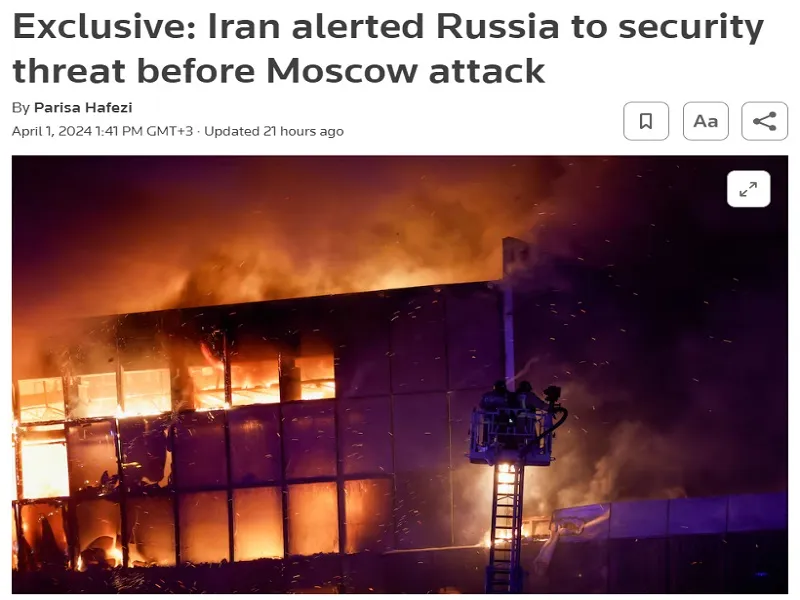
ANDREW KORYBKO
APR 02, 2024
This narrative is being pushed to deflect from the evidence tying Ukraine to the Crocus terrorist attack and to discredit the Russian security services.
Reuters cited three unnamed sources to exclusively report on Monday that Iran had allegedly tipped Russia off about a then-impending major terrorist attack after learning about it from ethnic Tajik ISIS-K terrorists who were detained after the group’s early January attack in Kerman. The information lacked specific details, but the outlet editorialized that “It is harder…for Russia to dismiss intelligence from diplomatic ally Iran on the attack” than from the West, the latter of which they claim that it downplayed.
Accordingly, Reuters wrote that this “raised questions over the effectiveness of Russian security services”, thus exposing the ulterior motive behind this report. The West has done all that it can to deflect from Russia’s accusations that Ukraine was tied to this terrorist attack via the evidence that its investigation has uncovered. This includes claiming that the vague warning that the US passed along to Russia was obtained from spying on ISIS-K, not on Kiev like this analysis here compellingly argues.
By including an Iranian dimension into the emerging narrative of early warnings ahead of the Crocus terrorist attack, the West via Reuters wants to further deflect from its own and Ukraine’s involvement in what happened while simultaneously discrediting the Russian security services. This analysis here debunks the false narrative that President Putin downplayed ISIS-K threats in the run-up to the attack, yet the West is doubling down on that claim, largely in response to evidence implicating Kiev.
To be sure, there’s a chance that one or some of those ethnic Tajik ISIS-K terrorists that Iran detained in January might have heard about the group’s plans to attack Russia, but that’s altogether different than them having knowledge of the then-impending Crocus plot. Russia already knows that it’s in that group’s crosshairs after they bombed its embassy in Kabul in September 2022. Without specific information, whether from Iran or anyone else, nothing on the home front would have changed in response to that.
For instance, Russia, the UK, or even a random social media person could vaguely claim that ISIS-K is planning to attack the US, which American officials themselves are already aware of but wouldn’t do anything differently on the home front upon being informed of the latest rumors. Likewise, it’s unrealistic to imagine that Russia would ramp up security at all large gatherings even if Iran told them that a detained ethnic Tajik ISIS-K terrorist might have claimed that the group is planning to attack it.
For what it’s worth, RT quoted Kremlin spokesman Dmitry Peskov as saying that “I do not know anything about this” when asked about Reuters’ report, so objective observers should be skeptical of it. He either wasn’t informed ahead of his media briefing that such vague information was allegedly passed along to Russia by Iran or it simply didn’t happen. It doesn’t matter which of these two is true though since it wouldn’t have made a difference either way for the reasons that were explained.
Promoting this unverified report from anonymous sources quoted by Western media is therefore only being done for the ulterior motives of deflecting from the evidence tying Ukraine to the Crocus terrorist attack and discrediting the Russian security services. Considering the driving force behind this latest report, it can be expected that more such stories might soon follow, and everyone should be equally skeptical of them as well while keeping in mind the narrative goals that they aim to advance.
https://korybko.substack.com/p/reuters- ... otives-for
